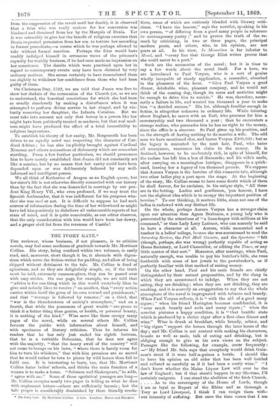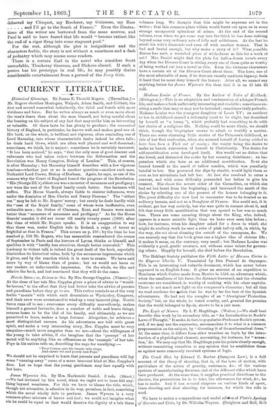THE IVORY GATE.*
THE reviewer, whose business, if not pleasure, is to criticize novels, may feel some modicum of gratitude towards Mr. Mortimer Collins. His story, being confined within two volumes, is easily read, and, moreover, short though it be, it abounds with digres- sions which serve the fiction-writer for padding, and allow of being skipped without detriment to the tale. Mr. Collins is fond of aphorisms, and as they are delightfully simple, or, if the truth must be told, extremely common-place, they can be passed over with easy strides. On one page, for example, we are told that "advice is the one thing which in this world everybody likes to give and nobody likes to receive ;" on another, that "every action carries within itself the germ of its own reward and punishment," and that "revenge is followed by remorse ;" on a third, that "war is the thunderstorm of society's atmosphere," and on a fourth, that while the possessors of great wealth "are prone to think it a better thing than genius, or health, or personal beauty, it is nothing of the kind." Wise saws like these occupy many pages of the novel, while on several others Mr. Collins favours the public with information about himself, and with specimens of literary criticism. Thus he informs his readers that he has only just ended his eighth lustrum, that he is a veritable Bohemian, that he does not agree with the majority, "that the heavy swell of the country" will not come to lounge on his lawn, "where there is barely room for him to turn his whiskers," that with him promises are so sacred that he would rather be torn to pieces by wild horses than fail to fulfil one. It is interesting to learn, too, that Mr. Mortimer Collins hates ladies' schools, and thinks the main function of a woman is to make a home. "Solomon and Shakespeare," he adds, "agree with me." Some of these egotistical passages are long— Mr. Collins occupies nearly two pages in telling us what he does with unpleasant letters—others are sufficiently laconic ; but the tale proper is considerably diminished by these friendly revela- • The Ivory Gate. By Mortimer Collins. 2 vols. London: Hurst and Blackett.
timer, some of which are curiously blended with literary criti- cisms. "I have the honour," says the novelist, speaking in his own person, "of differing from a good many people in reference to contemporary poetry ;" and he proves the truth of the re- mark by criticizing, in two or three pages, the principal modern poets, and others, who, in his opinion, are not
poets at all. In his view, In Mentoriant is far inferior to Maud, and "every line that George Eliot writes proves that she could never be a poet."
Such are the accessories of the novel ; but it is time to say a few words about the novel itself. For a hero, we are introduced to Paul Veryan, who is a sort of genius wholly iucapable of steady application, a sensualist, absorbed in the pleasures of the hour. "Give Paul Veryan a good dinner, drinkable wine, pleasant company, and he would not think of the coming day, though its cares and anxieties might be enough to drive him to suicide." He was, therefore, neces- sarily a failure in life, and wanted ten thousand a year to make him "a decided success." His lot, although familiar enough in fiction, is altogether unknown in ordinary life. While loitering about England, he meets with an Earl, who procures for him a secretaryship and two thousand a year ; then he encounters a strange recluse, who persuades him he has no right to the money, since the office is a sinecure. So Paul gives up his position, and on the strength of having nothing to do marries a wife. The odd man we have mentioned dies, and leaves Veryan £300,000; but as the legacy is contested by the next heir, Paul, who hates all annoyance, renounces his claim to the money. He is destined, however, to be moderately rich, in spite of himself, for the recluse has left him a box of diamonds ; and his wife's uncle, after carrying on a meaningless intrigue, disappears in a quick- sand, leaving her a legacy of ten thousand pounds. We suppose that Aurora Veryan is the heroine of this romantic tale, although two other ladies play a part upon the stage. At the beginning of the story, Mr. Collins seems to have some doubt which of them he shall favour, for he exclaims, in his unique style, "All three are in the betting. Ladies and gentlemen, 'pon honour, I have not the slightest idea which is to occupy the important position of heroine." To our thinking, it matters little, since not one of the ladies is endowed with any distinct life.
On the whole, perhaps Aurora Veryan has a stronger claim upon our attention than Agnes Brabazon, a young lady who is persecuted by the attentions of "a linendraper with millions at his command," or than Lady Lucy Latimer, who can scarcely be said to have a character at all. Aurora, while unmarried and a teacher in a ladies' college, because she was accustomed to read the Saturday Review, the Pall Mall Gazette, and the Spectator "felt (though, perhaps, she was wrong) perfectly capable of acting as Home Secretary, or Lord Chancellor, or editing the Times, or any little matter of that sort." Moreover, after marriage, when Paul, naturally enough, was unable to pay his butcher's bills, she runs forthwith with some of her jewels to the pawnbroker's, as if perfectly familiar with that method of raising money.
On the other hand, Paul and his male friends are chiefly distinguished by their animal propensities, and by the slang in which they are accustomed to indulge. When they are not eating, they are drinking ; when they are not drinking, they are smoking, and it is scarcely an exaggeration to say that the whole atmosphere of the novel is impregnated with tobacco and brandy. When Paul Veryan reflects, it is "with the aid of a good many cigars ; " when his friend Flarington becomes confidential, it is "over much brandy and soda and many cigars ; " when the novelist pictures a happy condition, it is "that beatific state which is produced by a choice cigar after a first-class dinner and wine." Wine is drunk at breakfast, while brandy, seltzer, and "big cigars" support the heroes through the later hours of the day ; and Mr. Collins is not content with making his characters, female as well as male, talk of eating and drinking, but is obliging enough to give us his own views on the subject. Passages like the following, for example, occur frequently : —" My friend Mr. Sala says that everybody would drink Guin- ness's stout if it were half-a-guinea a bottle. I should like to have his opinion on old cider that has been well bottled and cellared as carefully as if it had been a costly wine." "I don't know whether the Maine Liquor Law will ever be the law of England ; but if that should happen in my life-time, certainly emigrate. I can stand the abolition of the Irish Church. . . . . As to the sovereignty of the House of Lords, though I am as loyal as Rupert of the Rhine and as thorough Tory as Lord Liverpool, I think I can resign them with- out intensity of suffering. But once the time comes that I am
debarred my Clicquot, my Roederer, my Guinness, my Bass
and I'll go to the South of France." Even the illustra- tions of the writer are borrowed from the same sources, and Paul is said to have feared that life would "become extinct like the end of a cigar flung into some stagnant pool."
For the rest, although the plot is insignificant and the characters feeble, the story is not without a smartness and a dash of pedantry which may amuse some readers.
There is a certain Earl in the novel who considers Scott unreadable, Thackeray tiresome, and Dickens absurd. If such a person has his prototype in real life, he may possibly derive considerable entertainment from a perusal of the Ivory Gale.































 Previous page
Previous page